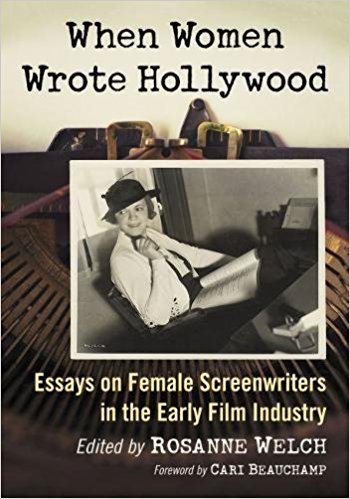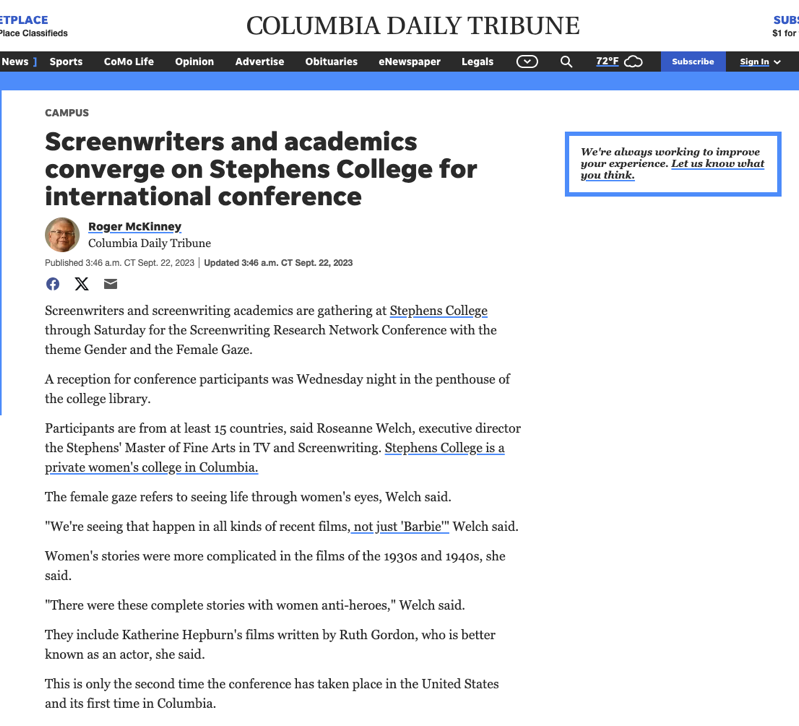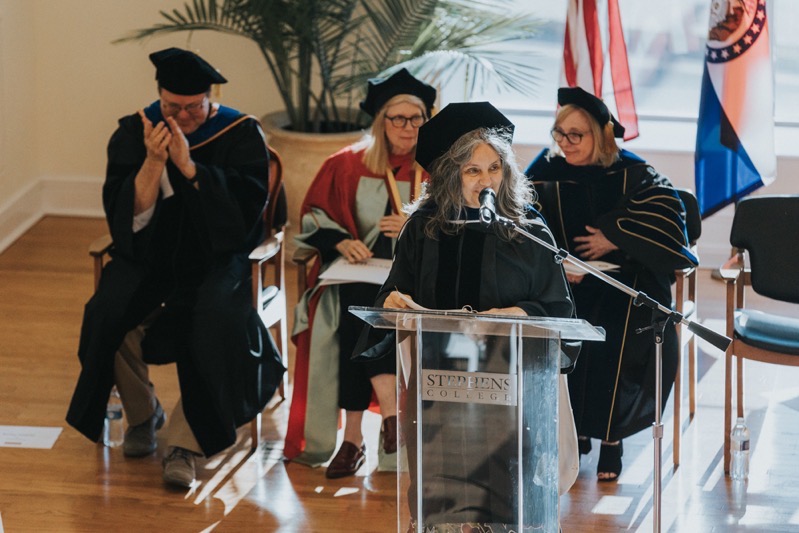Category: Stephens College
“Unapologetically Herself: Writing Bold and Complex Young Women” Panel at the Writers Guild Foundation – Friday, August 8, 2025, 7pm
Unapologetically Herself: Writing Bold and Complex Young Women
During every MFA Residency Workshop I moderate a panel of writers – often proudly including one of our MFA alums – and this August we’re doing it again. Join us on Friday, August 8, 2025 from 7:00 PM 8:30 PM at the Writers Guild Foundation (7000 West 3rd Street Los Angeles, CA, 90048) for:
Unapologetically Herself: Writing Bold and Complex Young Women
We’ll explore how writers develop these strong characters, how to approach sensitive scenes intentionally, and how they navigate nuances of character personalities, behaviors, and motivations.
Panelists include:
- Karen Joseph Adcock – Yellowjackets
- Beth Appel – The Sex Lives of College Girls
- Sahar Jahani – Life and Beth (MFA alum!)
- Autumn Joy Jimerson – Forever
- Dr. Rosanne Welch – Moderator/Executive Director, Stephens College MFA in TV and Screenwriting
Get tickts for this WGA Panel Discussion
And if you’d like to see some of our previous WGA panels you can find them on our MFA Website
“Writing Females in Leadership Roles” WGA Panel Now Online [Video]
Since there’s been so much talk this week about mothers being proud of their highly accomplished children it’s a wonderful week to share the link to the latest Writers Guild Foundation panel co-sponsored by the Stephens College MFA in TV and Screenwriting covering the topic of “Writing Females in Leadership Roles”.
Moderated by our Executive Director Dr. Rosanne Welch the panel includes three writers from shows that celebrate female leaders from the real-life 23-year-old Miep Gies who hid Anne Frank’s family to real-life First Ladies Eleanor Roosevelt, Michelle Obama, and Betty Ford to the fictional female leaders of Station 19. Many thanks to Joan Rater (A Small Light), Zora Bikangaga (The First Lady), and especially to our Stephens College MFA alum Alexandra Fernandez (Station 19) for joining us to discuss everything from our childhood role models of female leadership (mostly moms and aunties) to the traits we expect to see in our leaders, to the nuts and bolts of working in a television writers room.
Flipping Your Classroom with Dr. Rosanne Welch – Screenwriting Research Network Working Group on Comparative Screenwriting [Video]
Many thanks to SRN member Romana Turina for inviting me to give an online seminar on the benefits of Flipping Your Classroom for the Working Group on Comparative Screenwriting in the Screenwriting Research Network that she leads.
Every month she presents and records a guest lecture for our membership that is then open to the public once she posts it on YouTube.
![Flipping Your Classroom with Dr. Rosanne Welch - Screenwriting Research Network Working Group on Comparative Screenwriting [Video]](https://rosannewelch.com/wp-content/uploads/2024/04/srn-flipped-2024.jpg)
This month she asked me to speak about the pedagogy of flipping your classroom to enhance learning which, while created with K-12 students in mind is equally effective – and I would add necessary – in the world of MFA candidates. I use this practice in the teaching of screenwriting in our low residency Stephens College MFA in TV and Screenwriting.
It involves the professor providing less “Sage on the stage” performance and more student-focused opportunities. I’ve also come to describe it as not teaching (as defined by dumping all my info into their heads) but as curating an experience from which they glean the knowledge they need.
In the lecture I give examples of the kinds of activities I curate, keeping in mind the different learning styles each MFA candidate presents.
Podcast: Play in new window | Download
Subscribe: RSS
Applications Now Open – Stephens College MFA in TV and Screenwriting for Fall 2024
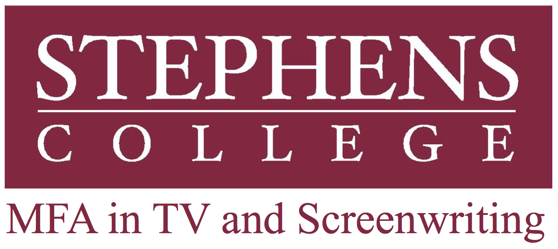
We’re excited to have opened the window for applications to our Stephens College MFA in TV and Screenwriting’s Fall 2024 cohort.
While we have rolling admissions until all seats in the new cohort are filled. If potential MFA candidates submit materials by March 30th and suit the criteria they will be in contention for our Jan Marino Scholarship (for a woman writer 45 or older).
Check out our new video with interviews with our most recent grads:
Inquire for more information on the program
or
Apply Now
Being a low residency program means you travel to Hollywood for 10 days at the beginning of each semester (once in August/once in January) for a workshop experience worth 3 units. We hold workshops at the historic Jim Henson Studios (originally the Charlie Chaplin Studios) in Hollywood, California.

Each semester students will take 3 courses after the workshop. They have one mentor for a television script and one mentor for a screenplay. The television mentors change each semester because in Fall semester you write a spec script/in Spring a pilot; the screenplay mentor is onboard for the whole year, as the Fall semester is all about developing an outline and writing Act One of the screenplay, and in the spring semester you complete and revise the script. Our instructors are all chosen because they are working writers and members of the Writers Guild of America (WGA).
In year two, there’s a second screenplay written (with a different mentor) and a thesis project, which can be anything from a web series to a limited series pilot and bible to a group of short films to an actual written thesis.
Our History of Screenwriting Courses are taught with a female gaze. Taught by our Executive Director so she can stay in touch with MFA candidates across their 2 years in the program. In the course, students read texts and view films each week that feature female-focused stories, and then post responses to the material. At the end of each semester, students turn in a profile of a screenwriter.
In 2017, 22 of these profiles written by MFA students were compiled into the book WHEN WOMEN WROTE HOLLYWOOD, published by McFarland Press.
If you are a writer looking to move your material to the next level so it will secure you a spot in the industry – or a college educator who wants a graduate degree to move up in the academic world – then our program is perfect for you.
Join us in Fall 2024 in Hollywood!
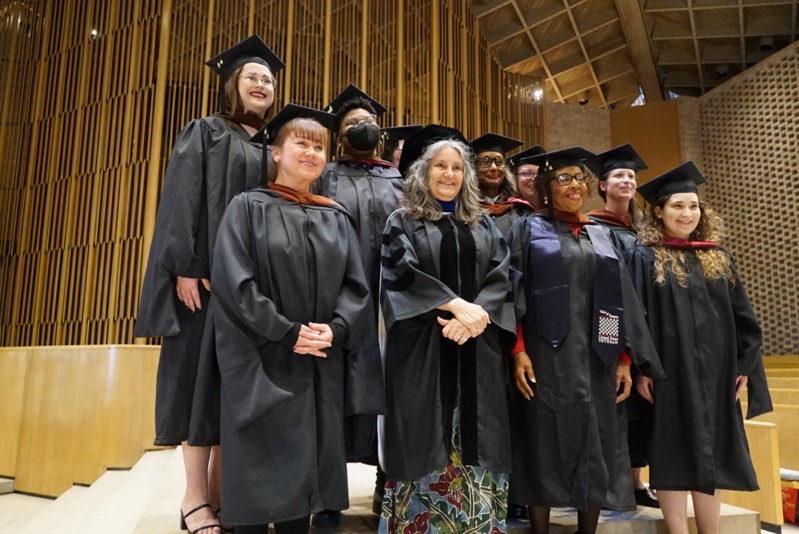
PRESS: Screenwriters and academics converge on Stephens College for international conference, Columbia Tribune, Columbia, Missouri
While it was a pleasure to host the Screenwriting Research Network’s 2023 conference last week. I love reconnecting with all the folks we see annually in such wonderful places in the world (from Leeds to London to Dunedin to Milan). But the other great thing about this event was the chance to share the Stephens College campus in Columbia, Missouri with everyone. This article in the Columbia Tribune covered the conference’s opening night reception and interviewed some of our international guests so it gives you a lovely feel of who was there and why we gather annually:
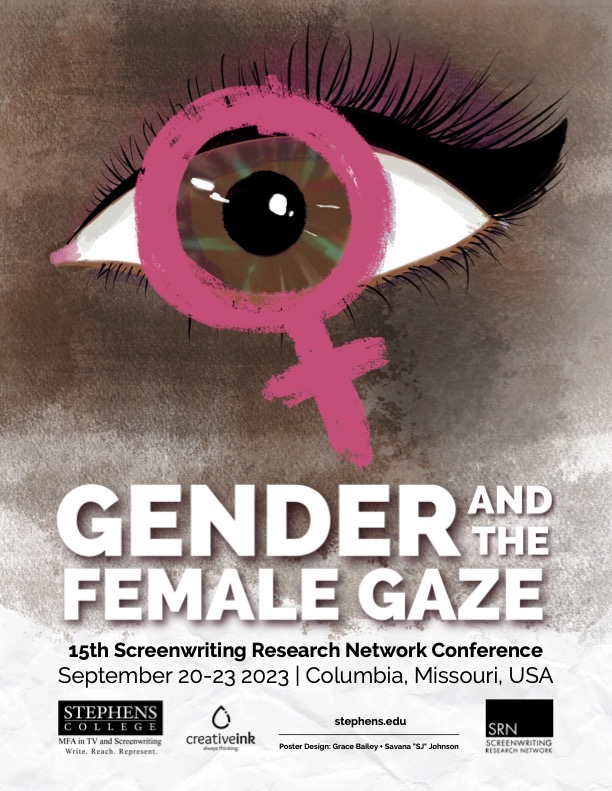 Screenwriters and academics converge on Stephens College for international conference
Screenwriters and academics converge on Stephens College for international conference
Screenwriters and screenwriting academics are gathering at Stephens College through Saturday for the Screenwriting Research Network Conference with the theme Gender and the Female Gaze.
A reception for conference participants was Wednesday night in the penthouse of the college library.
Participants are from at least 15 countries, said Roseanne Welch, executive director the Stephens’ Master of Fine Arts in TV and Screenwriting. Stephens College is a private women’s college in Columbia.
The female gaze refers to seeing life through women’s eyes, Welch said.
“We’re seeing that happen in all kinds of recent films, not just ‘Barbie'” Welch said.
Women’s stories were more complicated in the films of the 1930s and 1940s, she said.
“There were these complete stories with women anti-heroes,” Welch said.
PRESS: International Screenwriting Conference coming to COMO, COMO Magazine, Columbia, Missouri
International Screenwriting Conference coming to COMO
September 20-23 event will highlight female influence on film, television industries
Some of the biggest behind-the-scenes stars of television and motion pictures — the screenwriters — will converge on the Stephens College campus in Columbia from September 20-23 for the 15th Annual Screenwriting Research Network Conference.
Focused on the theme “Gender and the Female Gaze,” the three-day conference will bring an international collection of film professors and practitioners from Finland, France, New Zealand, Brazil, Italy, the United Kingdom, Germany, and other countries to Columbia. Attendees will get the chance to learn from experienced screenwriters, attend exhibitions, and network with other screenwriters.
Keynote speakers include Columbia native Phil Lazebnik, who has written screenplays for films including Pocahontas and Mulan, and Meg LeFauve, who was nominated for a Best Screenplay Oscar for the Pixar blockbuster Inside Out. Along with the keynote speech, LaFauve will appear for a Q&A after a public screening of Inside Out at Ragtag Theatre on Saturday, September 23.
Read the entire article – International Screenwriting Conference coming to COMO
Dr. Rosanne Welch Interview – She Served Too, KOPN FM, Columbia, Missouri [Audio]
![Dr. Rosanne Welch Interview - She Served Too, KPON FM, Columbia, MIssouri [Audio]](https://rosannewelch.com/wp-content/uploads/2023/10/rmw-kopn-interview.gif) While I was on the Stephens College campus a couple of weeks ago for the Screenwriting Research Network conference I had the pleasure of appearing on the She Served, Too radio show hosted by Elizabeth Herrera.
While I was on the Stephens College campus a couple of weeks ago for the Screenwriting Research Network conference I had the pleasure of appearing on the She Served, Too radio show hosted by Elizabeth Herrera.
A military veteran, Herrera also runs the Stephens College Mission Promise Kept program. Together we spoke about the many military women whose stories have yet to be told on the big (or small) screen including the Mercury 13. Herrera was kind enough to let me talk about the Screenwriting Research Network conference we were holding on the Stephens campus that week and, of course, about the many military women who have dome through our Stephens College MFA in TV and Screenwriting and how telling our stories helps us heal – whether we turn them into scripts or not it’s the act of talking and being heard that heals.
Podcast: Play in new window | Download
Subscribe: RSS
She Served Too
Every 3rd Tue at 5:00 PM With Elizabeth Herrera
Host Elizabeth Herrera has served in the United States Air Force, non-profits, and managing crisis care centers for women. On her show She Served Too, she discusses current issues from her unique perspective.
Commencement Speaker, Dr. Rosanne Welch Speaks On “Female Role Models from ’70’s TV” at the Stephens College Graduate Commencement 2023
On Friday, May 5th I had the honor of delivering the commencement speech at the 2023 Stephens College Commencement Ceremony for Graduate & Continuing Studies as part of having received the Distinguished Faculty Award for the year. The full commencement ceremonies for the 2023 Stephens College MFA in TV and Screenwriting include speeches by MFA student commencement speaker Natalie Cash Petersson and Stephens College President Dianne Lynch.
Together we covered the gamut from “How Watching 1970s TV Gave me the Female Role Models to Succeed in Life” through “How to Channel your Knowledge into Action” and “How to be a Lifelong Learner – After a Well-Deserved Break”.
You can listen to the short ceremony here (the audio is a series of slides but the audio is smooth).
Rosanne’s Speech
Complete Commencement Video
Podcast: Play in new window | Download
Subscribe: RSS
BEA Panels Prove Fun For Everyone
Thanks to my friend and colleague, Ed Fink I was invited to join a couple of panels at this year’s BEA (Broadcast Education Association) conference in Las Vegas last weekend.

One panel involved giving feedback on student pitches for TV shows or films and the other was more of a Q&A about careers in screenwriting. On both I was joined by other friends and colleagues from the writing world and the world of academia – David Morgasen (CSUF) and Jon Vandergriff (who teaches at a couple of colleges and happily one of them is the Stephens College MFA in TV and Screenwriting).
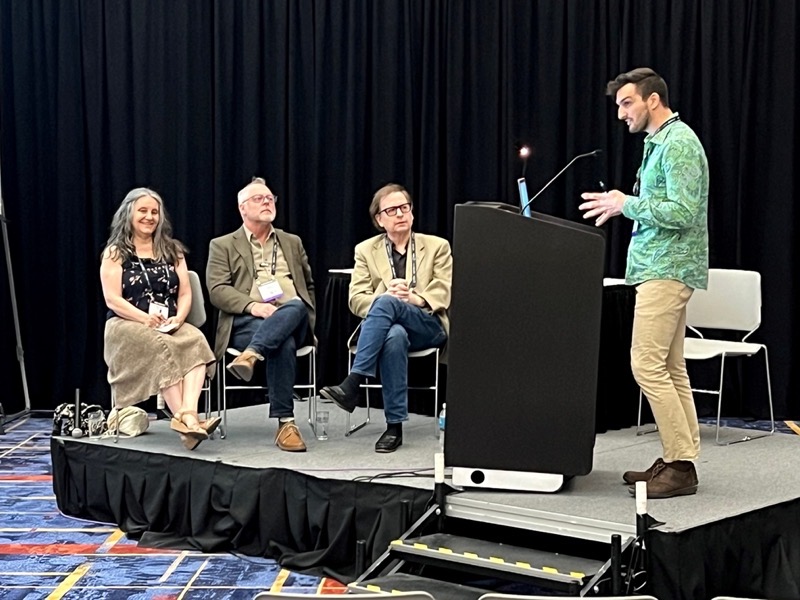
The stories we heard in the pitches were lively and several were quite unique, as were the questions about how to gain – and then maintain – a career in writing.
Afterward, the panels ended we three stood in the hallway so long continuing to answer questions such that we invited a few of the stragglers to dinner with us. Since we landed at Benihana we were joined by a father and son from Trinidad and Tobago who were in town for the father’s 30th NAB conference. During our conversation when they heard us mention Ted Lasso they had to ask how a country that doesn’t understand soccer/futbol watches a show set in that world. The film students with us were able to explain that from their generation forward, many, many young American children play on soccer teams – largely because they are co-ed in the younger years whereas baseball and softball segregate the sexes. Amazing the way a conversation ebbs and flows over flame-grilled shrimp and steak.

![WGA Panel on “Writing Bold and Complex Young Women” Now Streaming [Video]](https://rosannewelch.com/wp-content/uploads/2025/10/wgaf-young-woman-1-1200x675.jpg)
![WGA Panel on "Writing Bold and Complex Young Women" Now Streaming [Video]](https://rosannewelch.com/wp-content/uploads/2025/10/559668332_18399924133185912_2476280326578765353_n.jpg)
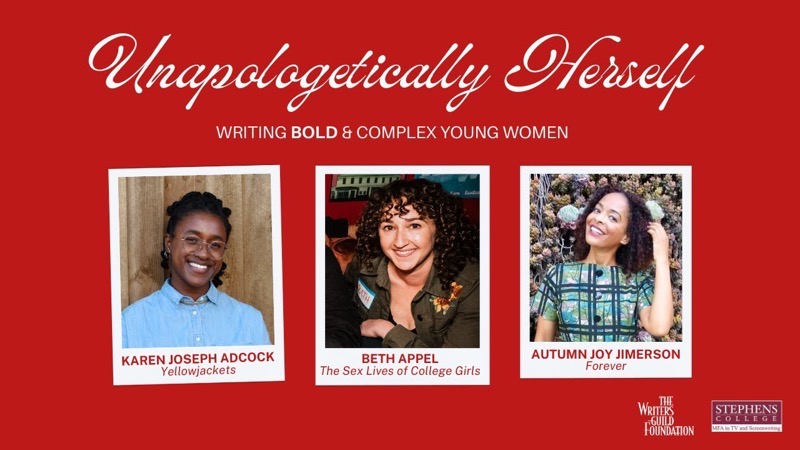
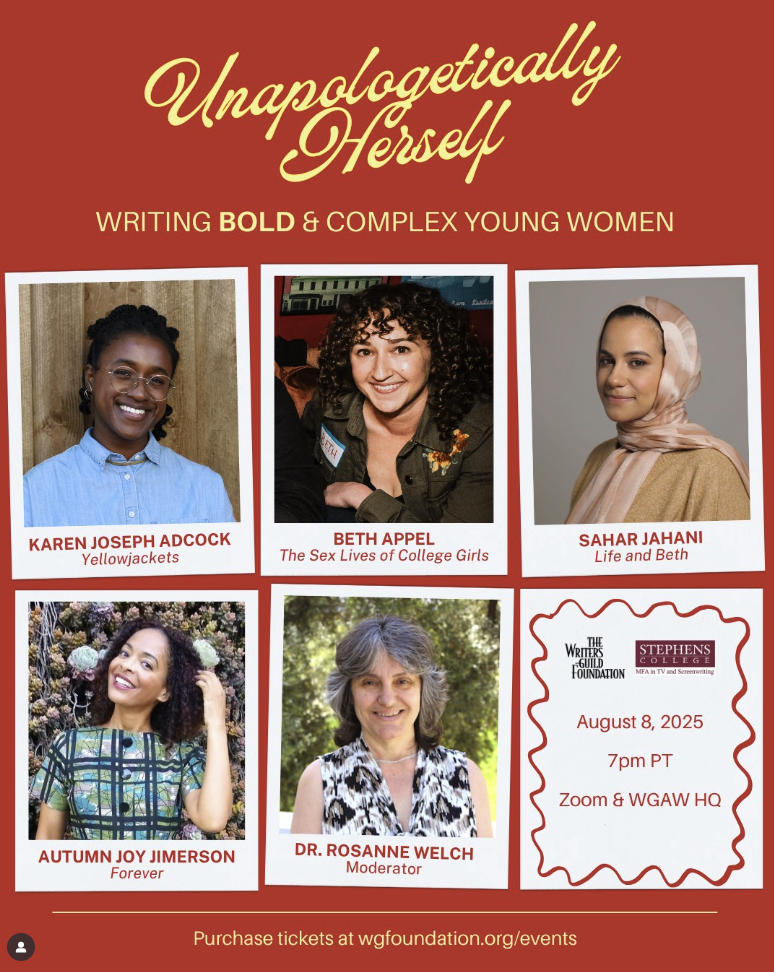
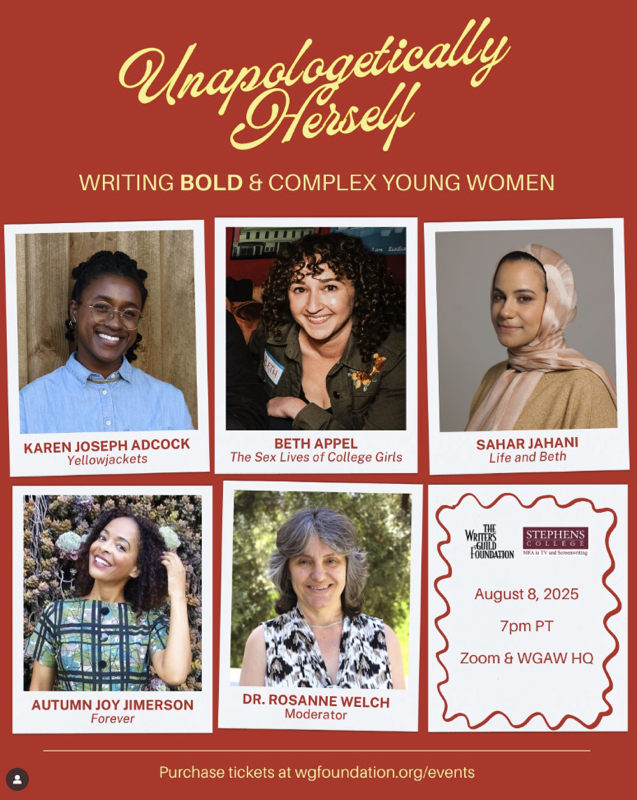
![“Writing Females in Leadership Roles” WGA Panel Now Online [Video]](https://rosannewelch.com/wp-content/uploads/2024/08/wgaf-female-characters-1.jpg)
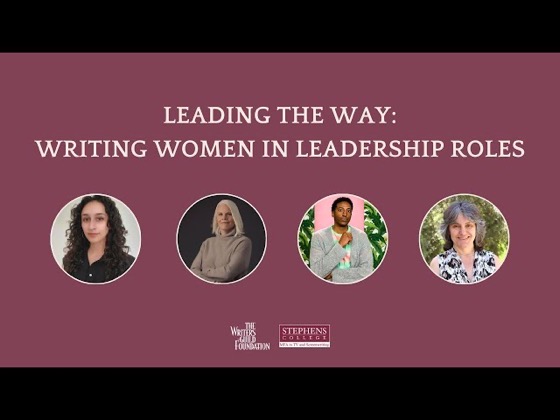
![Flipping Your Classroom with Dr. Rosanne Welch – Screenwriting Research Network Working Group on Comparative Screenwriting [Video]](https://rosannewelch.com/wp-content/uploads/2024/04/srn-flipped-2024-1.jpg)
